This is not just any drum. This drum is 160 years old and has a very special story.
This drum belonged to George Means Smart, a drummer with Company H 14th Massachusetts Heavy Artillery of the Union Army. George Smart was born 1845 in Andover. His parents, Hugh and Jane Smart had immigrated in 1842 from Brechin, Scotland to work in Andover’s Smith & Dove mill. Hugh was a flax dresser in the mill. His sons, Alexander and George also worked in the mills. In 1860, George was an apprentice machinist.
In the spring of 1861, with the Civil War just begun, George joined his brother, Alexander and brother-in-law Milton B. Townsend to fight in the Union Army.
George was only 16 when he left home as a drummer in the regiment. He carried his own drum, provided through funding from the town of Andover.
The rule in the Union Army was that soldiers had to be 18 to join, but many younger boys maintained “I’m over 18, sir.” Younger boys were assigned to non-combat positions as drummers or buglers, even though they rarely had any musical training.
During the Civil War, drums were used as invaluable communication devices in camps and on the battlefields. In the din and confusion of battle, it was almost impossible to hear commands and orders. In contrast, drum beats and bugle calls could be heard more clearly. Each order had a series of drumbeats to represent it.
Drummers and soldiers alike were required to learn dozens of drum calls. The playing of each drum call would tell the soldiers what they should do. They had to learn commands such as “meet here” “attack now” “retreat” in addition to many other battle orders.
When drummers weren’t needed on the battlefields they helped carry the wounded on stretchers or assisted in tending the wounded.
When the fighting began, drummers usually moved to the rear and stayed away from the shooting. However, Civil War battlefields were extremely dangerous places, and drummers were known to be killed or wounded.
George Smart and Company H were assigned to garrison duty at Fort Albany, a new fortification on Arlington Heights on the Virginia side of the Potomac River. Fort Albany was part of the ring of 23 forts built to protect Washington from being captured by the Confederates.
But there were still dangers.
Before the regiment saw any serious combat, George fell ill, probably from malaria which affected many in the company. George’s father, Hugh Smart, was notified that his son was gravely ill, and travelled to Ft. Albany. Unfortunately, George died on July 25, 1862 before his father arrived.
The death of their drummer boy hit Company H hard. One fellow soldier from Andover, “Gat” Holt wrote:
“Only think of it, he has got to die out here far from home and friends. He will never see his Mother nor his sisters any more. It makes me feel very sad to think of it.”
Andover Advertiser correspondent S.B. reported that all the soldiers who were off duty fired three volleys in tribute as they escorted Hugh Smart as far as they were permitted. Hugh Smart returned to Andover with his son’s remains and his drum.
Members of Company H 14th Regiment of Massachusetts sent a resolution home to George Smart’s family.
The drum remained with George’s family. It was a treasured item passed down through generations.
In August of 2012, George Perry donated his great-great-great-uncle’s drum, drum sticks and photograph to us. The drum had been holding a place of honor on the piano in the Perry family’s Reading home. Mr. Perry told us that the last time the drum had been played was in 1919, on Armistice Day, November 11th. Mr. Perry said that he donated the drum so that George Smart’s story would live on and be an inspiration to others.
We are honored to share his story.
Listen to George Smart's drum tell its story here.
Thank you to a History Buzz reader for sharing this video with us! Around minute 8:25 there’s a story about the company’s role in the Civil War.
Thanks for reading. If you enjoy these stories, please leave a comment or send me an email. I love hearing your stories and memories.
Thanks,
Marilyn Helmers
Mhelmers@andoverhistoryandculture.org
Resources
Andover Center for History and Culture Collection
ACHC Research files including research by Doug Mitchell (1941-2018)
Andover Stories – The story of George Smart
Memorial Hall Library Historical Newspaper Collection
Library of Congress Image Collection
The 27th Maine Volunteers Blog
McNamara, Robert. "The Role of Drummer Boys in the American Civil War."





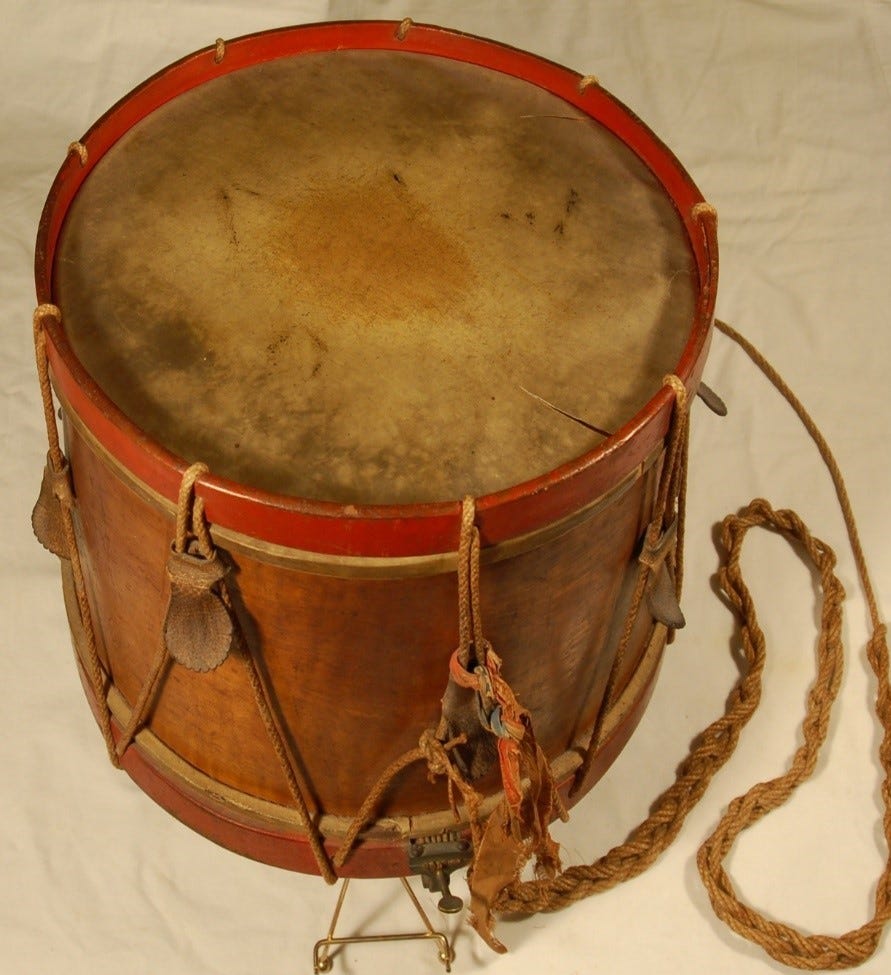

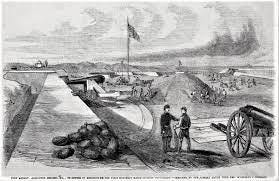
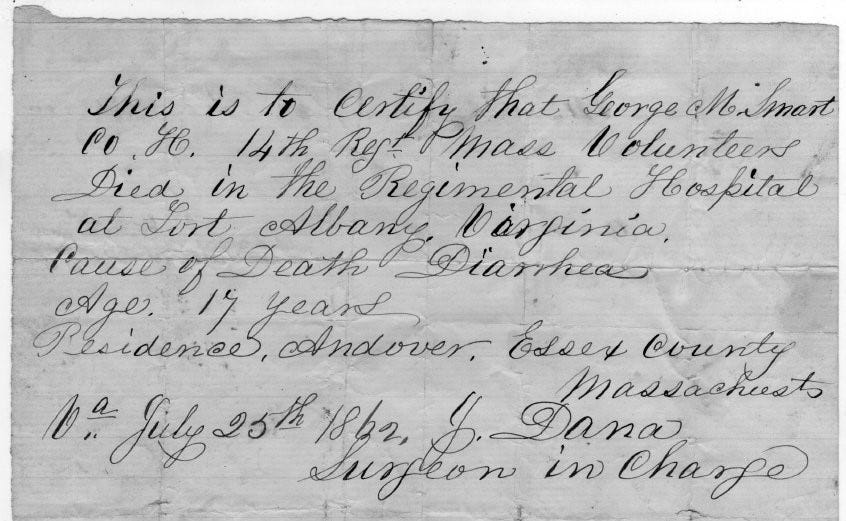
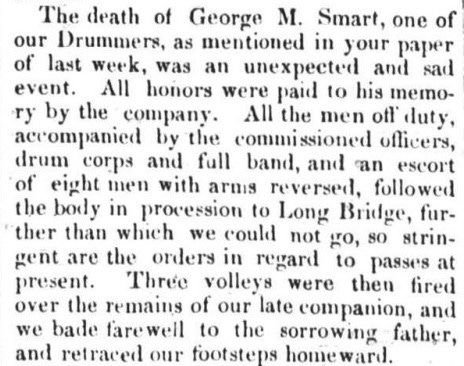
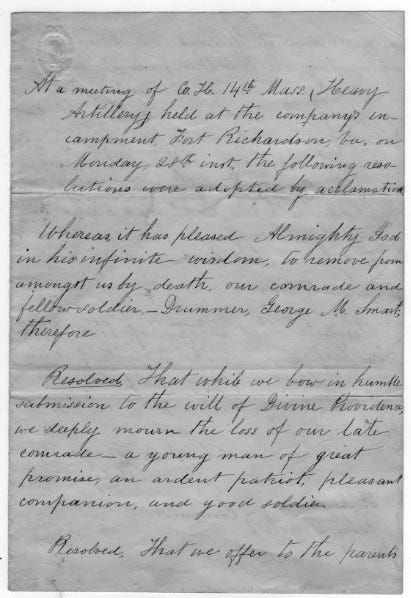
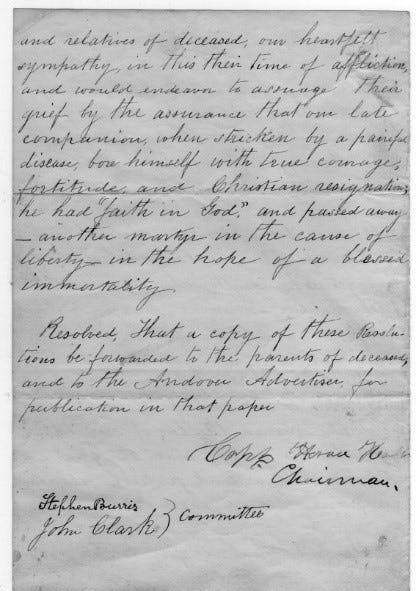

What a touching story!!! I look at my 14 year old grandson and cannot even imagine him leaving his family and going off to war.
Thank you for sharing!!!
Great story! I really enjoyed reading it and seeing the artifacts. I hope more are on the way!